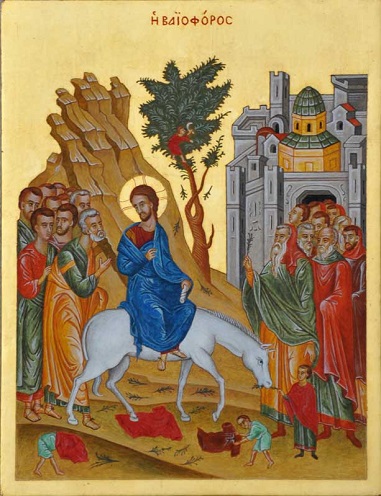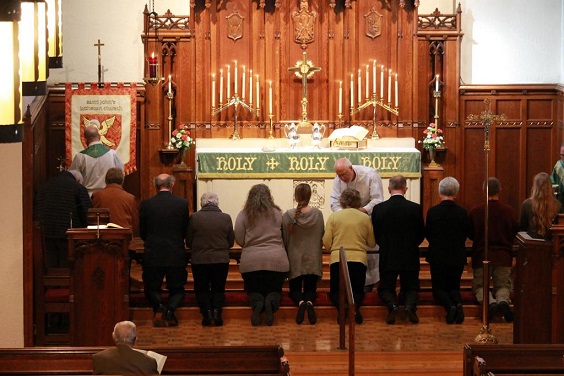Readings: Jeremiah 23:5–8 | Romans 13:11–14 | Matthew 21:1–9
Text: Jeremiah 23:5-8; Romans 13:11-14
The Lord promises three things through the Prophet here: Salvation, security, and righteousness.
We know salvation most of the time from the lack of it. Nobody asks to be saved from good days, joys, and pleasures. Instead, people cry out to be saved from disaster, betrayal, and danger.
Security is something we long for—the health and wellbeing of our loved ones, and protection of our property. In our time and place, we’ve become accustomed to a certain level of security. Police and military, safe food and water, courts, and technology all afford a feeling of security.

Righteousness is freighted with religious associations, but I would argue that every person knows righteousness. Perhaps not by that name, but as “being in the right” or “being accepted.” It is the quest for this that drives both the transgender to demand affirmation from society and that drives the excuses we make for our failures. We long for righteousness, even though we often look for it in the wrong place.
Salvation, security, and righteousness are basic human needs. And it was these which the Lord had once promised to Israel. When they were under the cruel yoke of Pharaoh in Egypt, the Lord promised to save them from their taskmasters. As they stood on the other side of the Red Sea, Moses led them in song, “The Lord is my strength and my song, and he has become my salvation” (Exodus 15:2) Repeatedly, as the records of Joshua and Judges and Samuel record, the Lord continued to save His people.
He promised them security, as they would dwell in their own land, safe from their enemies all around. “And all these blessings shall come upon you and overtake you, if you obey the voice of the Lord your God. 3 Blessed shall you be in the city, and blessed shall you be in the field…the fruit of your womb and the fruit of your ground… Blessed shall you be when you come in, and blessed shall you be when you go out. 7 The Lord will cause your enemies who rise against you to be defeated before you.” (Deuteronomy 28:2-7) They came close to this under righteous kings, but it never remained long.

Righteousness was handed down to them by the just decrees the Lord gave. As opposed to the ways of Abraham, the wandering Aramean [Deut. 26:5], before His call; against the practices of their Egyptian neighbors; abhorring the worship of the people of Canaan, the Lord revealed truth to correct man’s darkened imagination. So, He said to Israel, “Righteousness, and only righteousness, you shall follow, that you may live and inherit the land that the Lord your God is giving you.” (Deut. 16:20)
But all of these blessings seemed to pass away by the time of Jeremiah. Their salvation dissolved into captivity by the Babylonians; their hedge of security was torn down because of mass apostasy; their righteousness was in tatters so that they became a byword among the nations [1 Kings 9:7; Jer. 24:9].
In their low position, their Lord sends Jeremiah with His Word:
5 “Behold, the days are coming, declares the Lord, when I will raise up for David a righteous Branch, and he shall reign as king and deal wisely, and shall execute justice and righteousness in the land. 6 In his days Judah will be saved, and Israel will dwell securely. And this is the name by which he will be called: ‘The Lord is our righteousness.’
Salvation and security for Israel were promised in the land, a nation with rulers and borders. But that was hardly realized before it crumbled away. Even after the Exile, the return to Jerusalem was incomplete. It missed the goal because they forgot the Lord who brought them out of Egypt [John 8:33]. Security was lost to a strained tension with their Persian, Greek, and Roman rulers. Under the rabbis, righteousness had become a matter of obeying human precepts.

Nevertheless, “the days are coming,” the Lord declares. It will be sure, sure as the promise He made to Abraham: “‘Look toward heaven, and number the stars, if you are able to number them.’ Then he said to him, ‘So shall your offspring be.’” (Genesis 15:5) Where Israel had failed because of sinful weakness and disobedience, the Lord would succeed in His purpose.
However, His manner of saving and bringing security, of becoming our righteousness is not what we expect.
7 “Therefore, behold, the days are coming, declares the Lord, when they shall no longer say, ‘As the Lord lives who brought up the people of Israel out of the land of Egypt,’ 8 but ‘As the Lord lives who brought up and led the offspring of the house of Israel out of the north country and out of all the countries where he had driven them.’ Then they shall dwell in their own land.”
In our thinking, salvation means taking away the problem immediately and permanently. Wars are won when the enemy is defeated and retreats. The Red Sea deliverance was nice because it was visual, and the Israelites could see the dead Egyptian forces on the shore [Ex. 14:26-30]. But God’s salvation is immediate and permanent: “It is finished,” the Lord says from the cross (John 19:30). And He declares that salvation to you surely: “All of us who have been baptized into Christ Jesus were baptized into his death. 4 We were buried therefore with him by baptism into death, in order that, just as Christ was raised from the dead by the glory of the Father, we too might walk in newness of life. 5 For if we have been united with him in a death like his, we shall certainly be united with him in a resurrection like his.” (Romans 6:3-5) It’s a salvation that is received through faith in the Lord’s Word.

Security is a feeling most of the time. We feel safe because of our confidence in created things—trustworthy authorities, locks on our doors, vaccines, a gun in the safe. But creaturely security can quickly be shattered. Even worse, a false security can tell us not to worry about how God will judge us. But when God promises security, there is no higher authority and nothing can overturn it. When God gives security, it is sure: “38 For I am sure that neither death nor life, nor angels nor rulers, nor things present nor things to come, nor powers, 39 nor height nor depth, nor anything else in all creation, will be able to separate us from the love of God in Christ Jesus our Lord.” (Rom. 8:38-39)
As I mentioned before, human righteousness is always seeking affirmation—whether it’s before the true God or before other people. To be right is to be able to stand without shame and have some proof of being blameless. This is what the society does by making protected classes. The Lord our righteousness works in another way. He declares us righteous through His Son, who is without sin and who Himself took the blame and bore the shame as He hung naked upon the cross. That righteousness, He reckons to you through faith.

It’s to us that St. Paul writes:
11 Besides this you know the time, that the hour has come for you to wake from sleep. For salvation is nearer to us now than when we first believed. 12 The night is far gone; the day is at hand. So then let us cast off the works of darkness and put on the armor of light. 13 Let us walk properly as in the daytime, not in orgies and drunkenness, not in sexual immorality and sensuality, not in quarreling and jealousy. 14 But put on the Lord Jesus Christ, and make no provision for the flesh, to gratify its desires.
The days have come, which the Lord declared. But our reason and experience still cry out that something’s missing. His salvation, security, and righteousness are now. And we also look forward to even more: we wait for our salvation to be manifest, our security to be tangible and permanent, our righteousness to be revealed and not obscured by ungodliness.
We despise the ongoing burden of sin, death, and the devil, but we are sure that our God will deliver us from every evil. We long to live securely, yet we will not find it in this mortal life. Yet we will rest secure eternally. We hunger and thirst for righteousness, even while we see unrighteousness all around. Nonetheless, the Lord will surely satisfy us. [Matt. 5:6]
Beloved in the Lord, your God is faithful. He has done what He promised before and He will surely bring it to completion at the Day of Jesus Christ [Phil. 1:6]. Amen.






















